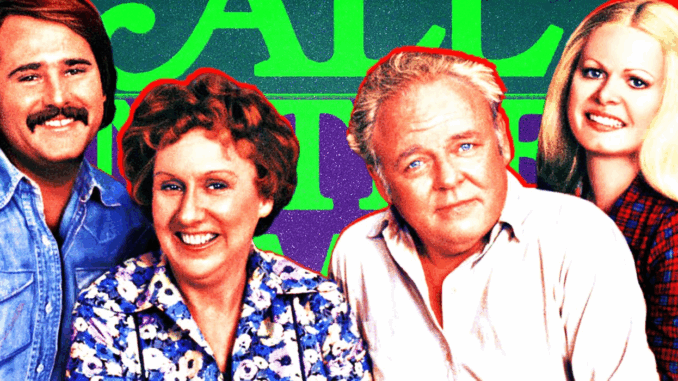
A loud-mouthed bigot. A liberal son-in-law. A household where every taboo got dragged into the daylight. This wasn’t just a sitcom — All in the Family was a cultural earthquake.
It All Started in a Living Room
When All in the Family exploded onto CBS in 1971, America was already boiling over. The Vietnam War, civil rights protests, and generational divides were tearing the country apart. Then came Archie Bunker — a working-class white man with a loud voice, stronger opinions, and absolutely no filter.
Played by Carroll O’Connor, Archie was blunt, offensive, and — to the horror and delight of millions — incredibly real. He dropped racial slurs, mocked feminists, feared change, and said what many wouldn’t dare speak aloud. The twist? He wasn’t a villain. He was the main character.
You Laughed, But You Also Squirmed
All in the Family wasn’t about feel-good family moments. It was about truth bombs wrapped in laughter. In a single episode, you’d hear debates about:
-
Racism and white privilege
-
Homophobia and gender roles
-
Abortion and women’s rights
-
War, religion, and class warfare
Think sitcoms are all fluff? All in the Family brought real America to prime time — raw, unfiltered, and unashamed.
Critics Hated It — Viewers Couldn’t Look Away
Yes, the show sparked outrage. Religious groups, conservatives, progressives — everyone had something to say. But controversy only fueled its success. All in the Family topped the ratings for five years straight. Archie Bunker, despite (or because of) his offensive rants, became one of the most iconic characters in TV history.
He was the man people loved to hate, but couldn’t stop watching.
A Legacy That Still Echoes
All in the Family didn’t just win awards — it changed television forever. It gave birth to spin-offs like The Jeffersons, Maude, and Good Times, each tackling issues mainstream media used to avoid. Its DNA runs through modern shows like Family Guy, The Office, Black-ish, and The Carmichael Show.
In today’s world of political correctness and cancel culture, All in the Family feels more relevant than ever — precisely because it wasn’t afraid.
So, Was It a Sitcom or a Cultural Time Bomb?
The answer: both.
All in the Family dared to say the ugly truths out loud — not to glorify them, but to confront them. And in doing so, it made millions laugh, cringe, argue, and maybe even think a little harder about their own beliefs.
Final Thought:
If today’s TV shows feel too safe, too sanitized, or too afraid to offend, just remember: once upon a time, a grumpy old man in a Queens living room changed everything — just by refusing to shut up.
